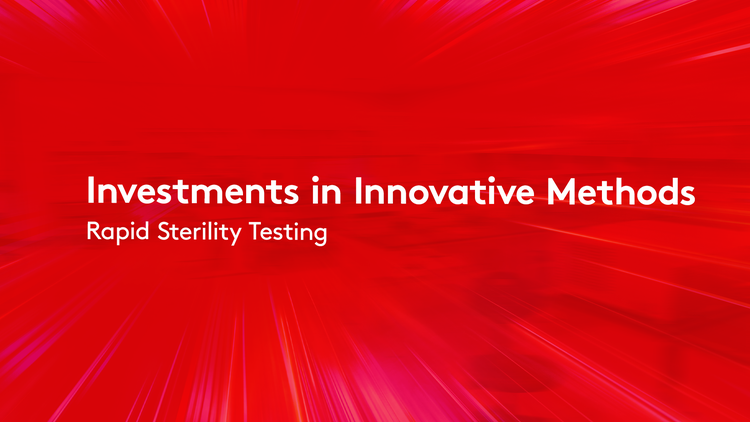
Aldevron Breakthrough Blog
Investments in Innovative Methods: Rapid Sterility Testing
October 13, 2020 / by Aldevron
Speed, control and comparable results: these are among the foremost needs of contract development and manufacturing organizations (CDMOs) and our clients when it comes to plasmid DNA that will be used to support cell and gene therapy at a research, clinical and commercial level. As an early adopter of rapid sterility testing, Aldevron delivers on all three.

Aldevron recently invested in a BacT/Alert® 3D Dual-T system by BioMérieux for rapid sterility testing. It boasts a validated method using this fully automated system built on BioMérieux’s patented colorimetric technology that detects microorganism growth by measuring carbon dioxide (CO2) in the culture medium.
By innovating at the right time and inserting this technology into our quality process, we can now provide a capability that the majority of other contract development and manufacturing organizations (CDMOs) have yet to adopt in latter stages of research, clinical and commercial manufacturing. In doing so, we’ve put ourselves – and our clients – ahead of the curve.
Sterility in Pharmaceuticals
Sterility in pharmaceutical research refers to the absence of viable microorganisms. According to the World Health Organization, “In pharmaceutical science, a container is defined as sterile when the probability is less than one out of one million that it is contaminated with replicating microorganisms.” Sterility testing is carried out to ensure the plasmid DNA, among other final material we manufacture and dispense under aseptic conditions, is negative for the presence of microorganisms.
Rapid sterility testing is exactly what it sounds like, sterility testing that takes less time than the traditional compendial sterility testing process. (Learn more about our process here)
The compendial methodology is covered under USP <71>, which is a reference to where it can be found in the U.S. Pharmacopeia (USP). The U.S. Pharmacopeia “...is a reference of uniform preparations for the most commonly used drugs – with tests to ensure their quality, potency and purity.” It is also a guide for regulatory agencies that are responsible for ensuring pharmaceutical manufacturing is done properly and safely.
Documentation for rapid sterility testing, taking into consideration the guidance delineated within USP <1071>, was finalized in December 2019. By that time, Aldevron already had initiated the first phase of validation for our BioMérieux instrument and methodology.
CDMOs like Aldevron must adapt to the changing regulatory landscape, and as early adopters we have placed ourselves and our clients in the lead.
Control
With rapid sterility testing capabilities, Aldevron now offers an in-house assay that not only affords placing the final product in clients’ hands faster, but also ensures our stringent requirements for quality are being met for this pivotal check of the final material release testing process.
We have long been outsourcing sterility testing, and with it some level of control. With compendial sterility testing, external labs manage part of the process; any unplanned occurrences on their end significantly delay timelines. With in-house rapid sterility testing, Aldevron maintains full control of the materials release.
Speed
We recognize that our clients need their materials as soon as possible; plasmids are often the first of many critical materials required in a manufacturing supply chain.
The lead time, or incubation period, from the beginning of testing a sample to the final read for sterility is seven days. With the rapid sterility testing capability in house, we’re able to deliver both test results and products to clients within just seven to nine days.
Compare that to the incubation period for compendial sterility testing, which is 14 days. For outsourced testing per compendia via USP <71>, the time from delivery of clients’ samples to Aldevron, the validation process, and shipment of their products stretches out upwards of 20 days.
The time savings can be extremely valuable to clients who are engaged in a wide range of therapeutic development projects, clinical trials and medication or treatment delivery.
Since Aldevron provides the starting material for their manufacturing cohort, they have to wait for us before they can begin their work. This is true even if they’re outsourcing manufacturing to another provider; our final product more than likely serves as the front-end material for their processes, as well.
Comparable Results
We show our clients that, even though we’re speeding up the process, we’re not compromising testing effectiveness or quality of the product we deliver. That comes down to comparable results.
In a larger sense, I mean three things when I say comparable results.
First, it’s what you expect: Aldevron is demonstrating comparability data between the compendial and rapid methods. In simple terms, the results need to be the same regardless of which process we use on a sample.
Second, we’re reinforcing our reliability. As we work with clients through early development and clinical trials using rapid sterility testing, we’re proving our ability to deliver test results and plasmid DNA more quickly. By the time they begin manufacturing and marketing a drug or treatment, we want them to have full confidence in the new process.
Finally, with rapid sterility testing, we’re again proving the way we handle clients’ samples throughout the entire manufacturing cycle.
Sterility via USP <71> has always allowed us to verify our aseptic manufacturing protocols, from operator and engineering efficiency to total control over the manufacturing environment. All of our touchpoints, any kind of manipulation that’s taking place in the cleanrooms, is done in an aseptic manner.
Now, comparing those results to the new rapid methodology bolsters and instills confidence of product sterility claims via the newly adopted technology.
Either Way, We’re Ready to Serve
Acceptance of alternative rapid microbial tests is already growing in the industry. Even so, Aldevron continues to offer outsourced USP <71> sterility testing for our new and current clients, as we prove the effectiveness and reliability of our new rapid sterility testing methodology.
The incorporation of a more streamlined method such as rapid sterility is just one example of the way in which we are focused on continuing to support the industry, and ultimately deliver life-saving therapies to patients. We continue to invest in streamlining our processes and increasing our capacity to support our clients.
We’ve made the investment. It’s validated. We’re ready.
